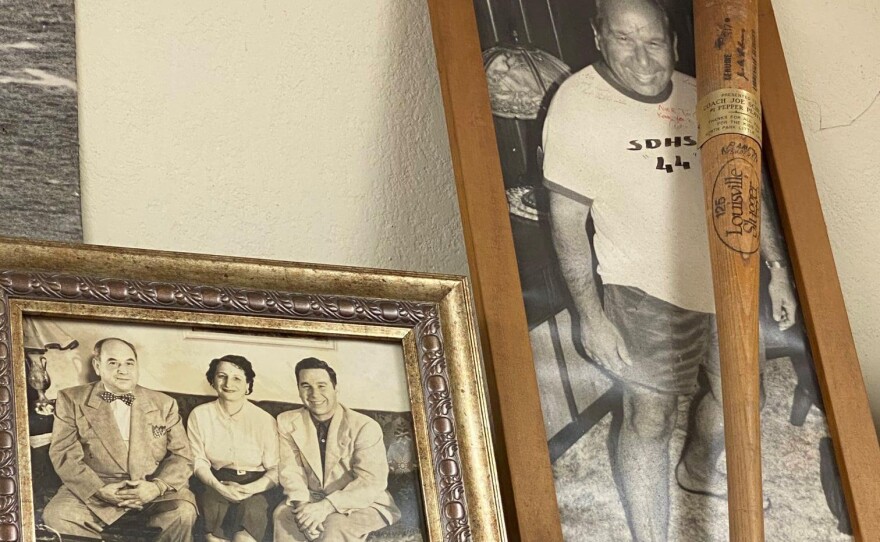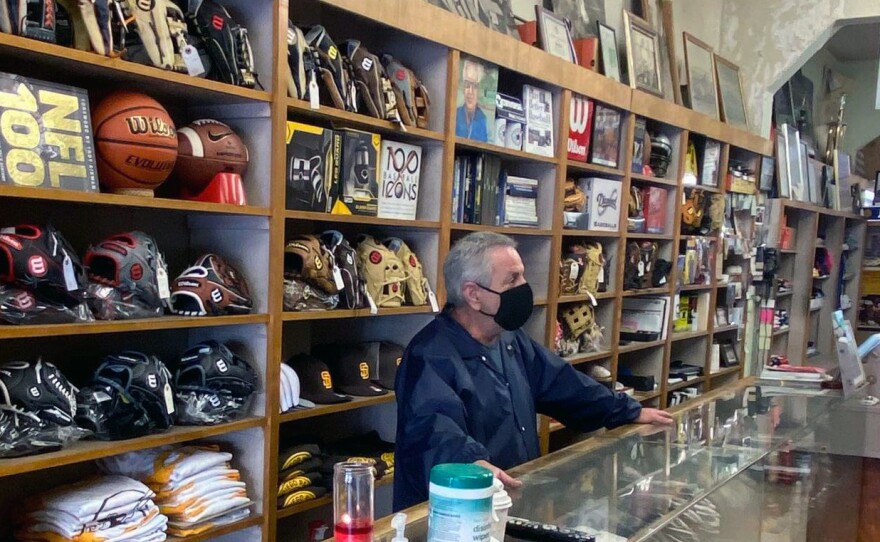This story is part of a series, Pandemic Life: One Year On. Click here for more.
A&B Sporting Goods in North Park was going strong heading into 2020. It had orders from youth sports teams, including the entire North Park Little League, and owner Gregg Schloss felt like the business his grandfather started in 1941 would have a banner year.
Then came March.
“When the pandemic hit, we knew we were in trouble right away,” Schloss said. “I knew we were going to have to make a difficult decision.”
He held on as long as he could, but the cancellation of all youth sports was too much to bear. In January, the 80-year-old business closed its doors.
An economic tracker from Harvard and Brown Universities found that in San Diego County, the number of small businesses still operating fell by almost 37% between January 2020 and last month. Meanwhile, small business revenue in the county fell by almost 30%.
“Almost a third of all small businesses say they are still struggling,” said Ray Major, the chief economist at the regional planning agency SANDAG.
This, of course, means massive job losses. The California Employment Development Department estimates that 59% of the local workforce is employed by businesses with 100 or fewer employees. Their closures have destroyed wealth that took generations to build and frayed the fabric that holds communities together.
COVID-19’s final toll on San Diego’s economy will take years to calculate, said Eduardo Velasquez, the research director at the San Diego Regional Economic Development Corporation.
“We may not know for a long period of time how big those losses will be, how permanent closures will be, how many job losses we will sustain,” Velasquez said.
But, he said, a few trends are already clear: retail and hospitality will be impacted the most, and small businesses are more likely to fall into those sectors.
“A study from the JPMorgan Chase Institute found most small businesses only have enough cash on hand to cover 14 to 15 days,” Velasquez said. “So if they have to shut their doors for more than two weeks, they’ve burned through their cash reserves, and all of a sudden they’re behind on every bill that they have to pay.”
Since February 2020, 580 businesses have notified the San Diego Workforce Partnership of layoffs or furloughs, accounting for 90,000 employees, said Rachel Merfalen, the nonprofit’s director of business services.
In a typical year, the Partnership receives 100 to 150 such notices. And the closure of businesses goes beyond the financial impact, Merfalen said.
“It’s a relational and emotional decision,” she said. “We hear from owners who are sacrificing things on the family side to save a business, who are making personal investments to keep the business running.”

That’s true of Veronica Densey, who’s using her disability checks to keep her massage business Nola San Diego in the East Village open. She closed in March, reopened in June, then closed again, reopened again. Her most recent reopening came after the December shutdown, but with half of her normal massage therapist staff.

“I'm a disabled veteran right now using my disability to try to pad my business, just so that I wasn't $20,000 in back rent,” Densey said. “I was dying a little every time I wrote that check because I was wondering if I was throwing this money away and I didn't even know if we would ever open again. I've got three daughters, and I had to dip into their college fund a little bit. And I'm just like, OK, well, this has to stop because I can't bankrupt my family with no other answers.”
Maribel Estrada said she has to keep her City Heights restaurant El Toro Grill Taqueria going because it’s her only source of income to support her four children. She runs El Toro with her husband and said she’s made it through the openings and closings by doing takeout and online orders, but only can go another month without filling her indoor dining space with paying customers.
“My main thing is to keep going, grow up the business, so my kids can work there and stay on and manage the business, so they can continue having something,” Estrada said. “It doesn't mean they have to be in the restaurant all the time and not getting a career, but they have something already so they can start.”

Family businesses are a big source of generational wealth, particularly for immigrants and ethnic minorities, said Juan Pablo Pardo Guerra, an associate professor of sociology at UC San Diego.
“Family businesses are particularly efficient at accumulating wealth and social mobility because they are better at spanning local networks, attracting customers on the basis of connections families have made and don’t require massive capital investment,” Pardo Guerra said. “Small businesses become assets, they can be passed on to other generations. And that’s not the same as employment, working for someone else, because you can’t leave your jobs to your kids.”
And like with so many of the ills brought by the pandemic, businesses owned by people of color have suffered disproportionately. A nationwide study by the Federal Reserve Bank of New York calculated that since the onset of the pandemic Black and Latino business ownership dropped by 41% and 32%, respectively. Meanwhile, white business ownership dropped by 17%.
“Businesses owned by minorities are more likely to have less resources, so they’re more likely to fail,” Pardo Guerra said. “Smaller businesses in lower income areas are also less likely to get cash from things like federal loans, and were less likely to have bank loans in the first place. “This crisis is exacerbated by inequality. Any inequality that existed will just be worse.”
When businesses like Estrada’s City Heights restaurant close, the impact on the neighborhood goes far beyond the services they provide.
“It has potential to reshape the city,” Pardo Guerra said. “Because of the longstanding division in neighborhoods in San Diego, neighborhoods with more businesses owned by Black and Hispanic people are more likely to fail, and that means less services in those neighborhoods, less employment, worse educational outcomes, and worse career opportunities.”
The pandemic and its massive upheaval of small businesses should be a wakeup call and a chance for regional leaders to show they value those businesses, said Enrique Gandarilla, the director of the City Heights Business Association.
“If we want dynamic communities, we need to support small businesses,” he said. “We forget small businesses are the backbone of the economy, and losing them means undermining our entire economic system.”

For Schloss, the owner of A&B Sporting Goods, it’s too late. He was unable to get a PPP loan because he didn’t have any employees, and while he got $3,000 in a city small business grant, that covered less than one month’s expenses. His store in North Park now sits vacant, and he’s left wondering what to do next.
“I thought that I would feel like there's a huge weight being lifted off of my shoulders, and it has been financially, but as far as knowing what's next for me, I still feel like I'm floating around in a boat to a certain extent,” he said. “It is hard because I'm a routine-oriented
person. I went to the store every day at 7:30 in the morning for 40 years. So that's that's a difficult routine to stop all of a sudden.”








